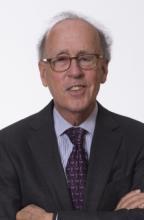Fareed Zakaria: Facing a Post-American World - An Interview
Fareed Zakaria is author of The Post-American World and editor-in-chief of Newsweek International. He spoke with NPQ editor Nathan Gardels in June.
NPQ | Barack Obama has been reading your book The Post-American World. If he becomes president, what is it that you most want him to take away?
Fareed Zakaria | I hope he grasps that the third great powershift of the modern era is taking place. The first was the rise of the West. The second was the rise of America as the leading Western power. Now we are seeing the arrival of a post-American world-not because the United States is declining, but because the rest are rising.
This shift is not about Bush or about Iraq. It is a much deeper and broader phenomenon of the rest of the world catching up. For the US to thrive in a world like this, it must adjust economically, politically and culturally.
At a political level, Obama talks the right language about engaging the world with a political and not a merely military attitude. At an economic level, however, this historic shift is going to be more challenging for him and for Democrats in general. This is a world where the US had the lowest corporate tax rate 20 years ago and now has the second highest-not because the US rate was raised, but because everyone else lowered theirs! Then, of course, Democrats tend to be quite retrograde on freer trade.
Facing a post-American world means America will have to play better at every level because these days we have lots of competition. It is not just about India and China. In 2006 and 2007, 124 countries grew at a rate of 4 percent or more, including 30 countries in Africa.
The US can thrive in this economic environment because it is not a zero-sum game. The pie is expanding and we can all have our share. In purely political and military terms, of course, there will be some relative US decline because that kind of power is more zero-sum in nature. This shift I'm speaking of will not take place overnight. The US will remain a central player for a long time, but from now on we will have to share power with others who have come to the table.
NPQ | Some, like Singapore's Kishore Mahbubani, say that a post-American world where the rest rise will necessarily be de-Westernized. Do you see it that way?
Zakaria | What does it mean when people say that the Asian countries are reinventing modernity, that the next wave of modernization will be non-Western? In some sense, this is undeniably true. Chinese is a non-Western language, and those who are modernizing China speak it. India has cultural traits America does not have, as does Japan.
But the striking thing is that the West has been dominant for so long, it has put such a distinctive stamp on the modernity it invented that no one really knows how to escape it. What will Indian corporations look like as India becomes more prosperous? Well, InfoSys, Tata and Wipro look about the same as corporations in Silicon Valley or other IT companies.
We all live so completely in a Western world we don't how to invent a non-Western modernity. Would we do away with double-entry bookkeeping?
China's cities mostly look like those in the West, the same structures only with Chinese architectural flourishes. The highways, road and bridge structures are the same. If you are growing up in China today, you are living in a more Westernized China than at any point in the prior 5,000 years.
NPQ | Can there be modernity that is not secular and democratic, but religious or illiberal?
We see that in China modernization does not include the Western features of human rights and democracy. The example of Russia suggests that the future may belong more to the Putins than the Havels of history. We see in Turkey under the Justice and Development Party (AKP), with its Islamist roots, that modernization does not necessarily mean a secular, but a religious, outlook. The recent ruling to allow women to wear headscarves at university can be seen as a symbol of non-Western modernity.
Zakaria | The GDP per capita in China is about $4,000, and the government still has fairly tight control of the country. Yet, the economy is increasingly open and, in many social aspects, there is great openness. At $4,000 GDP per capita, what Western country had substantially greater political freedom than China? Britain or America, perhaps. France, Austria-Hungary, Germany? Certainly not.
What we regard as Western modernity came at the long end of a train of highly repressive, dictatorial regimes that opened up very slowly against the wishes of the powers at the time. Kaiser's Germany was highly illiberal. That was the 1900s.
Chinatoday is according more respect for human rights than at any time in its past, mainly as a consequence of its contact with the West. It would not have happened otherwise.
On a 25-year timescale, Russia has moved forward quite substantially. On a five-year scale, it has moved backward. It is not non-Western culture but the abundance of natural resources that have retarded political modernization there, just as in Saudi Arabia. Russia is a Siberian Saudi Arabia.
Turkeyis more interesting. There you had a forced, totalitarian modernization on the Western model imposed by Ataturk. What we are seeing now is an incredibly healthy process where the society is modernizing rather than merely the state. As the society modernizes, it is asking for some space in cultural terms that is not entirely Western.
Here, you are absolutely right. There is a facet of non-Western modernization. At the same time, all the society is asking for is the same right accorded every American of choice in free religious expression. It is just a doff of the cap to the line in the Koran that says women should dress modestly. Only the French and Turkish states had imposed Enlightenment liberalism by dictat. Now, that is what is illiberal, not the right to choose.
Still, what we are witnessing in all these countries is that, because of increasing contact with the West as they open up, they are adopting a form of modernity that is broadly part of the framework created by the West, with some interesting variations, but not vastly different. Bollywood films may not look like Hollywood films, but they all have chase scenes and love stories.
NPQ | The Islamic activists of the AKP in Turkey argue that Ataturk believed only secularism equaled modernity because positive science is what created progress. They think a religious culture can also be scientific and technologically modern.
Zakaria | Let's not create a stereotype of what Western modernity looks like. Britain is not technically a secular country since the head of state is also head of the church. Germany funds Catholic and Protestant churches, something unthinkable in the US. What is happening in Turkey today is more in accord with those societies in the West, including the US, who have always given religion space in the public realm.
Turks are reacting to the complete rejection of any role for religion in society. Ataturk's model was unsustainable in the long run in a society that is 90 percent Muslim in a world undergoing a broad religious revival. Yet, when a synagogue is bombed in Istanbul, there is general sympathetic commiseration for the victims. That pluralist spirit is a core value of modernity.
NPQ | So, on a global scale, you don't see a post-American world becoming less Western and more traditionally, say, Asian. Rather you see a new cosmopolitan, hybrid global culture emerging within the international rules-based system that America largely constructed?
Zakaria | That is precisely right. First of all, there is no such thing as Asia and "Asian values." There is India. There is China. There is Japan. There is Afghanistan. Asia is a Western construct. To find something that unifies the Afghans and Koreans would be an heroic undertaking of generalization.
These societies are moving into a Western-created modernity, and as they rise in power they redefine that modernity in a way that doesn't change its central aspects-science and technology, commerce and capitalism, shift from countryside to the city-but colors its character. The model here is the US. As immigrants came into the US, they changed its complexion, but at the end of the day the basic formula of America, the structure of society, has remained similar.
The core issue is not going to be about culture. The issue is whether the rising powers will get a respected seat at the table. It is not a matter of "letting them in." They have to want to integrate themselves into the existing international order because they believe it will give them a voice commensurate with their accomplishments and status.
If that process goes well, there will be a stable world order. If not, the world order will be unstable. In either case, it is largely an issue of power, not culture. In cultural terms, the British and the Germans in 1914 were very similar. They still managed to destroy the world.
NPQ | Bill Clinton said some years ago that America's strategic vision ought to be "to make the world safe for interdependence" because the US would not always be on top. The rise of the rest really only means they are joining the post-WWII American-framed international order-the United Nations, Bretton Woods, the World Trade Organization-with its commitment to universal rules of openness that have spread gains widely. Isn't that essentially what you are saying?
Zakaria | I would put it this way: America's key challenge is to maintain and refurbish the structures of stability for global economics and politics as this huge powershift takes place, as the rest rise. The key challenge is drawing the new great powers such as India and China into this system so they feel they have an investment in maintaining it.
Unfortunately, this supremely important task doesn't stir the soul as much as, say, combatting some menacing evil. You won't hear many people issuing trumpet calls on behalf of stable interdependence. Yet, that is precisely the challenge. We have created a system where others feel they can rise to power without going to war, raping, pillaging and plundering.
We should be mindful of how historically unique this situation is and focus on how we can keep it going. We need to be mindful of the morality of this struggle to create a world in which hundreds of millions of people can live better lives than ever before.
To be sure, this sounds like some wonky appeal to shore up international institutions. It may not have the appeal of unfolding a banner to go out and fight the next crusade, but it is by far the more noble cause.
Copy Right Nathan Gardels, see NEW PERSPECTIVES QUARTERLY - NPQ.
If you wish to comment on this article, you can do so on-line.
Should you wish to publish your own article on the Facts & Arts website, please contact us at info@factsandarts.com. Please note that Facts & Arts shares its advertising revenue with those who have contributed material and have signed an agreement with us.

















